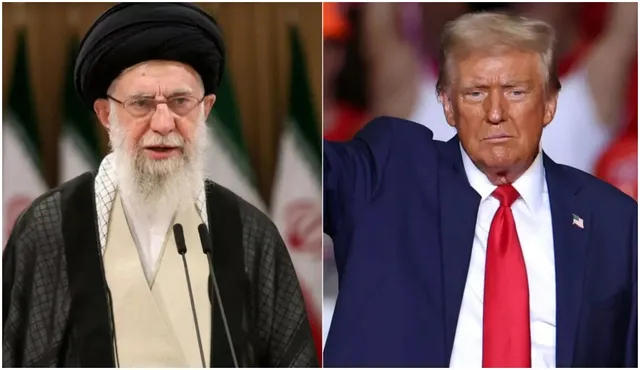- By Shubham Bajpai
- Sun, 22 Jun 2025 11:59 PM (IST)
- Source:JND
Tensions have reached to recent high after the United States launched precision strikes on three key Iranian nuclear facilities - Fordow, Isfahan and Natanz - on Sunday morning under Operation Midnight Hammer. Terming the strikes a violation of international law, Iran has vowed strong retaliation. Here are 10 point on the fresh escalation after US' formal entry into the conflict that could turn towards another distant war for America.
1. Vowing retaliation against the US strikes, Iran on Sunday warned that every region in the United States, be it civil or military, is a legitimate target for them, the state broadcaster said.
2. Iranian President Masoud Pezeshkian in a phone call with French President Emmanuel Macron reiterated retaliation to US strikes, saying, "The Americans must receive a response to their aggression." Macron on the other hand urged him to exercise utmost restraint and renounce nuclear weapon.
3. Iranian Parliament approved the closure of the Strait of Hormuz, a key oil supply route in West Asia. The final decision on the matter would be taken by the Supreme National Security Council of Iran. Reacting to it, US Secretary of State Marco Rubio termed the step 'economic suicide'. In an interaction with Fox News, Rubio asked the Chinese government to stop Iran from making what he called another 'terrible mistake.' He said, "I encourage the Chinese government in Beijing to call them about that, because they heavily depend on the Straits of Hormuz for their oil."
"If they do that, it will be another terrible mistake. It's economic suicide for them if they do it. And we retain options to deal with that, but other countries should be looking at that as well. It would hurt other countries' economies a lot worse than ours," he added.
4. Hours after the US strikes, Israel and Iran exchanged intensified barrages on Sunday. Israel struck Bushehr province in Iran, which houses the country's only civil nuclear site, a power plant run with Russian assistance. This came a day after the UN nuclear watchdog, IAEA, said that an attack on the Bushehr nuclear site would prompt a radioactive catastrophe.
In retaliation, Iran struck Israel with at least 40 missiles, including Kheybar Shekhan, its biggest projectile.
5. Providing details about the US operation, Chairman of the Joint Chiefs of Staff, General Dan Caine said that 125 aircraft and several B-2 bombers carried out the strikes on Iranian nuclear facilities. US Secretary of Defence Pete Hegseth called Washington’s ‘Operation Midnight Hammer’ against Iran an “overwhelming success", adding that they “devastated" Iranian nuclear facilities at multiple locations.
The operation involved a deception strategy carried out with strict secrecy, with knowledge to only key people in Washington and Tampa.
6. Iranian Foreign Minister condemned the attack, terming it a violation of international law, the UN Charter, and the Nuclear Non-Proliferation Treaty (NPT). he added that there is no red line that the US has not crossed.
Alleging criminal behaviour by the US, Iranian Foreign Minister Seyed Abbas Araghchi said that the attack will have 'everlasting consequences.' Araghchi has headed to Moscow, where he will meet Russian President Vladimin Putin on Monday.
7. Russia has also condemned US strikes, calling it violation of international law. Russian Foreign Minister Sergei Lavrov harshly criticised the operation, labelling it a violation of international law and UN Charter. "The irresponsible decision to bomb the territory of a sovereign state...grossly violates the UN Charter," Moscow stated.
Meanwhile, former Russian president and the deputy chairman of Russia's Security Council, Dmitry Medvedev questioned the outcomes of the US strikes, saying that it not only failed to achieve its objective but had, in fact, produced the opposite result.
He said that several nations are prepared to extend nuclear support to Iran. "Trump, who came in as a peacemaker president, has started a new war for the U.S.," Medvedev added.
8. Pakistan, which has also condemned the US strikes and extended support to Iran, is making efforts to schedule the UNSC emergency meeting. Pakistan's Deputy PM and Foreign Minister Ishaq Dar said, "Emergency Meeting of the UN Security Council, at the request of Iran, supported by Pakistan, China and Russia is being scheduled this afternoon New York time!"
ALSO READ: India Evacuates 1,428 Nationals From Iran Amid Rising Tensions After US Strikes
9. While the US termed the strikes largely successful, the Atomic Energy Organisation of Iran has stated otherwise. Reza Kardan, deputy director of the Atomic Energy Organisation, stated that previously planned measures prevented radiation outside these sites.
IAEA also confirmed that there was no increase in off-site radiation levels. Satellite imagery has indicated activity near Fordow before the attack. Reports have suggested that key elements were removed from the facilities before the attack and that the Iranian nuclear programme is damaged but not destroyed.
10. Prime Minister Narendra Modi received a call from the Iranian President, who briefed him about the escalation and Tehran's stand. PM Modi urged to de-escalate and use diplomacy instead, while thanking him for his unprecedented support to the Indian evacuation efforts under Operation Sindhu in the times of crisis.

